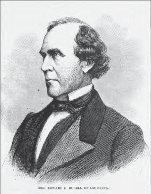 Edward Henry Durell served as a judge on the United States District Court for the Eastern District of Louisiana for ten years, through the tumultuous and strife ridden Civil War and Reconstruction eras, to an unhappy and virulently political end.
Edward Henry Durell served as a judge on the United States District Court for the Eastern District of Louisiana for ten years, through the tumultuous and strife ridden Civil War and Reconstruction eras, to an unhappy and virulently political end.
Judge Durell was born on July 14, 1810, in Portsmouth, New Hampshire. He attended Exeter Academy and earned a degree at Harvard College in 1831. He was fluent in German, French, and Spanish and "read law" to enter the bar in 1834. He established his own law office in New Orleans in 1837, and became deeply involved in the affairs of his adopted state and city. In the 1850s, he drafted reforms to Louisiana inheritance law, was a member of the New Orleans City Council, reorganized the fire department, and wrote a new City Charter that overhauled taxation and provided for paved streets.
In his 2010 study published at 13 Green Bag 2d 153, author Charles Lane described Durell as "an ardent Union man, reflecting his New Hampshire roots and New Orleans" dependence on trade with the North. . . . [W]hen Louisiana seceded in January 1861, Durell quit the Democratic Party in protest. After New Orleans fell to Union forces, Durell served briefly as Interim Mayor and was appointed United States District Judge for Louisiana by President Abraham Lincoln on May 20, 1863, receiving both United States Senate confirmation and his commission on February 17, 1864. As federal judge, "he firmly enforced the federal Civil Rights Act of 1866" and was "the first federal court in which former slaves sat as jurors alongside whites." In 1871, when Judge Durell "openly considered resigning" to return to the North to marry, "32 members of the New Orleans bar," mostly ex-Confederates and Democrats who had come to respect the judge despite his party leanings, "implored him to stay" by writing a petition that described Judge Durell as "tried, faithful, able, learned and incorruptible."
At the end of 1872, Judge Durell presided over a lawsuit filed by William Pitt Kellogg, Republican candidate for governor, against sitting Louisiana Republican Governor Henry Clay Warmoth, who Lane wrote "controlled the state's electoral machinery [and] collaborated with the Democrats [mostly ex-Confederates who advocated a "white man's government"] to suppress black voting and stuff ballot boxes," in violation of the new 15th Amendment and its federal Enforcement Act. Judge Durell ruled for Kellogg and entered orders backed by federal troops to prevent Warmoth's armed seizure of the state government and usurpation of the election, which was awarded to Kellogg. Lane wrote that "[u]nable to seize the state, Louisiana white supremacists turned to revenge against Durell." An alliance of Warmoth's Republican allies and Democrats on the U.S. House Judiciary Committee voted 6-5 to impeach Judge Durell on false charges of drunkenness and corruption, although their real reason was political vendetta. When Democrats shortly thereafter won a huge majority of the House in 1874, Judge Durell faced certain impeachment, and he resigned on December 4, 1874.
Judge Durell moved to New York City, where he married a widow, Mary Seitz Gebhart, practiced law and wrote a history of the South, which he never completed. He died on March 29, 1887, and is interred in Pine Hill Cemetery in Dover, New Hampshire.
